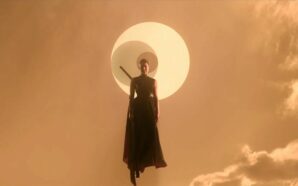It’s three a-m, and I am throwing both hands up in the air in frustration as I get lost again along an already well-trodden path. Or in this case, a network of pathways all leading to one of two conclusions: Success or Death.
I have been playing Infocom’s text-based adventure game, Trinity. Written by Brian Moriarty, it was released in 1986 – exactly a decade before I was born. I decided to investigate this subject after watching John Robertson’s The Dark Room at the Edinburgh Fringe, a show that invites audience members to play a live version of the 80s text adventure, throwing them back into a time when ‘video games were hard and good’. (A very funny show, by the way! Well worth seeing if you’re ever at the Fringe Festival!)
‘Come on, how hard can it really be?’ I thought, after watching volunteers from the audience make the same mistakes over and over again. It’s always easier to play from the side-lines, isn’t it?
Trinity isn’t Space Invaders or PacMan.
I have already been vaporized by the atomic bomb four times. I have had my neck snapped by a vicious monster of darkness, whose lair is impossible to escape without first making sure you have obtained the torch in level 1, meaning I had to restart from the beginning. I have fallen off cliffs and tumbled into chasms. Each time, I have crossed the river Styx and ‘presented the Oarsman with a silver coin [I] didn’t know [I] had’.
Basically, my character has died a lot in the last 12 hours. I’m frustrated, and therefore addicted to this game. Not to mention it’s also a literary masterpiece:

Did you just quote Pope at me?
If you are reading this as a text-adventure veteran, I know you’re smirking.
I am just like every other twenty-year old who owns a record player. Thanks to Friends re-runs, Stranger Things and San Junipero I am nostalgic for an era which I have never lived in. All my memories of the Cold War are GCSE History lessons, and from the introductory comic that was in the downloadable game manual.
I haven’t discovered a lost relic of the technological age. This is not The Da-Vinci Code. But for the average computer-literate-person and someone my age, it sure feels like it. For those not intimately acquainted with MS DOS, installing the game and getting it to run on Windows 10 was just as challenging as the game itself. If anything, it was part of the 80s romanticism.

Alex Warren anticipates this ‘boring, predictable’ reaction in his post ‘Text-Adventure Games are Still New’– something I found whilst searching for a download link for Trinity. Warren, creator of text-adventure engine, Quest, reminds us here that these 38-year-old games are still in their infancy when compared with other art-forms such as films and novels.
He seems to wish for people to stop ‘rediscovering’ the old games and start creating new text-based adventures:
‘I think we need a new generation of authors to come along, unhindered by 1980s expectations of what a text adventure should look like, and in the spirit of sheer ignorance, create games that will excite and inspire us all […] a renaissance.’
Agreed. However, I would like to remind him that the Renaissance – a French word meaning ‘rebirth’ – came about when European scholars of the Middle Ages rediscovered the learning of Ancient Greek and Roman cultures. They too, were nostalgic for an era in which they never lived.
Discovering Trinity in 2018 is like the game-play of Trinity itself- you go down a rabbit hole to find the vast world that sits behind it. As Warren says, it is one that still gleams with possibility.
This article therefore, goes out to all the Fortnite players, the GTA Grandmasters and wannabie designers, writers: the millennials. I invite you to play the 80s text-based adventure. To turn off the light pollution of graphics and sound, and to rediscover the universe where it all started. You’ll have your wits and patience tested, you’ll be drawing maps, and looking up Greek letters and 20th century history at 4am. You’ll even learn about MS DOS. You won’t get Gamer’s Wrist. You’ll be stressed.
It is only by understanding the text-adventures of the past that we can be inspired to create the text-adventures of the future. Perhaps then, we will get the DOS-games renaissance the veterans (and hipsters) so crave.








